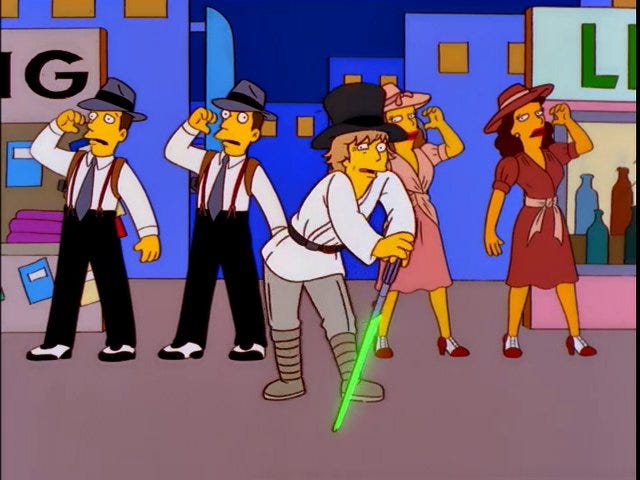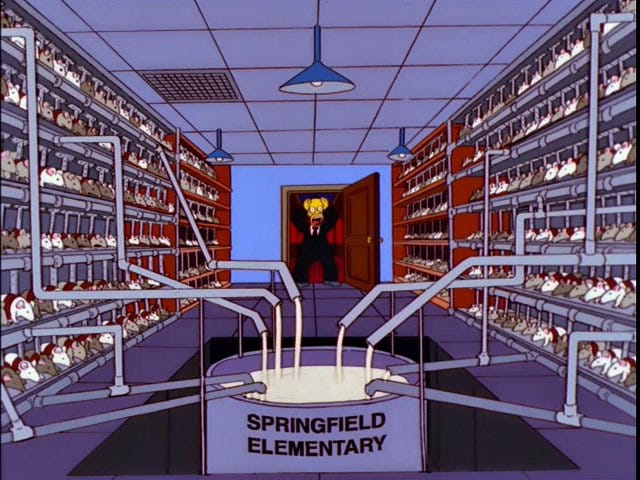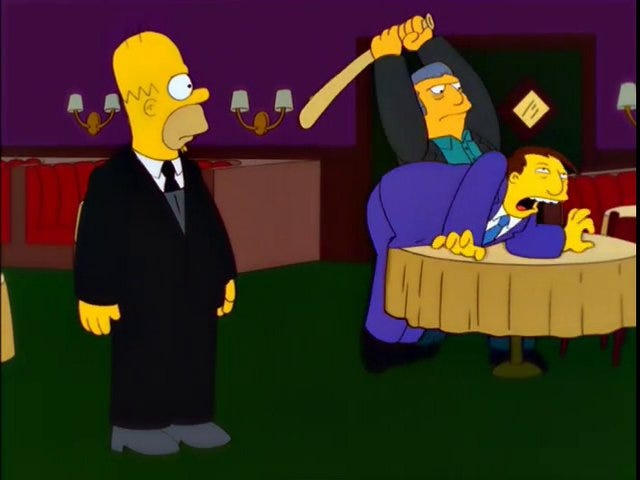There’s active debate about which seasons truly comprise The Simpsons’ Golden Age. The default parameters are seasons one to ten. For me, it’s seasons three to eight. Wherever you draw the line most everyone agrees that it’s over after season ten, when some of the show’s most persistent criticisms become far more frequent. Homer’s an asshole, irrelevant opening acts, the plot development is ridiculous and all of a sudden The Simpsons, which used to be like this, becomes an animated billboard hawking a rotating cast of celebrity guests and their interesting performances. The thing is, all those elements were present before the golden age ended, and many good episodes were made after season ten. Things become a formula for a reason, so what happens when it works and everything falls into place? ‘Mayored to the Mob’ IS the episode, pepper steak IS the entree.
The irrelevant act one set piece has been met with its fair share of derision and for good reason. Sometimes they’ll be better than the episode that ultimately follows, sometimes they’ll waste a third of the show on nothing and leave the rest feeling rushed and unsatisfying. ‘Mayored to the Mob’ employs this formula, but does so in a way that establishes enough significant plot elements that it never feels detached from the main storyline. After a wonderful Thousand Dollar Movie bit, the first act is a trip to BiMonSciFiCon, a geek convention where you can meet Mark Hamil, Alf, and many more of your favourite stars. It’s basically a barrage of nerd-related gags, Comic Book Guy shows up, Bart gets hit on by an elderly man. Suffice it to say, the episode isn’t about nerds.
Eventually, Mayor Quimby invites Mark Hamil onstage, who simply shills for telecommunications provider Sprint. The nerds want to hear him talk about Star Wars instead, so a riot breaks out. Homer Simpson: Nerdbuster, goes into rage mode and carves a path through the melee, rescuing both Mark Hamil and the Mayor. Quimby’s security personnel were outside wondering about the fluffiness of the clouds, so he fires them and appoints Homer his new bodyguard. The plot is underway, Homer protects the Mayor, I hope this doesn’t result in any shenanigans. Importantly though the first act set piece also introduced another plot element, Mark Hamil, originally within the episode’s first couple of minutes. So while the BiMonSciFiCon isn’t super important, it’s still a relevant beat in setting up and furthering the rest of the plot.
Mark Hamil’s appearance in this episode exists in this flux state between ‘look a famous person’ and a genuine original character, to the point where it now almost seems like a parody of what a Simpsons cameo would become. Hamil’s painted as a washed-up hack reduced to a spokesman for inferior-style phone companies, and a major player in terrible dinner theatre productions. When he’s introduced he’s in costume as Luke Skywalker for BiMonSciFiCon. Then when we see him again at the conclusion of the third act he’s still in costume as Luke Skywalker, and resentful of this fact all along the way. To me, peak Mark Hamil will always be the Joker, but it’s a fact that there is no Mark Hamil the celebrity, without Star Wars.
That marketing angle, that he played the protagonist in probably the most consequential cinematic franchise ever is subverted by the manner in which he’s portrayed. It creates an odd recursion. Mark Hamil operates both as mindless hype they can put in the promo, yet as a satire of celebrity status itself. He’s instrumental in the incitement and resolution of the narrative, but only as a supporting player. The episode is never about him like ‘When You Dish Upon a Star’ or ‘Lisa Goes Gaga.’ Hamil the character is portrayed as nothing without Star Wars, much the way Hamil the guest star would not appear without Star Wars, yet the events of the episode itself would not exist without Hamil the character. It’s this interesting natural integration of a celebrity into the story that separates it from other later appearances from war criminals or flavours of the month that exist to either stroke the subject’s ego or kill thirty seconds in an otherwise unrelated plot.
The rest of the episode revolves around a character called Homer Simpson. So, does ‘Mayored to the Mob’ feature Jerkass Homer? Is Homer an asshole for no reason in this episode? Most of the time he’s actually quite noble. His first most jerkish action is to kick his way through a crowd of people, but he does that to save Mark Hamil and Mayor Quimby. Once he becomes the bodyguard he’s party to a lot of corruption, but is too stupid to notice it at first. Then when it’s thrown in his face that the Mayor is cool with Fat Tony using rats for the elementary school milk, Homer rushes to save his children, confronts the Mayor, accidentally throws him out a window, and refuses to save him unless he stops working with the mob. Bold behaviour? Yes. Chaotic Good behaviour? Certainly. Asshole behaviour? I don’t think so.
It’s still the Scully era though, so Homer’s not quite the kind-hearted oaf he was in the series’ prime. He does use his Vulcan Nerve Pinch on his wife and children, but it’s not to be cruel, it’s merely to get himself out of an awkward conversation. He’s also weirdly chicken about getting into his car after Fat Tony threatens to whack the Mayor, suggesting Bart start it for him, before ultimately deciding to walk to work. I feel this doesn’t work because once the Mayor’s at genuine risk Homer is completely fearless in taking on violent mobsters armed with knives and bats. Still, Homer’s worst behaviour in this episode is motivated by a desire to protect his life, and a desire to protect his job. And no real person has ever been a dick in order to preserve either of those things…
You can blame The Simpsons’ decline on a wide variety of things, but it’s ultimately always going to fall on the writing getting worse. The staff got tired, old, and ran out of funny ideas. An irrelevant opening set piece can remain relevant so easily into the main plot that it’s either laziness or sloppiness that creates an opening like ‘The Lastest Gun in the West.’ A celebrity cameo can become a great thing provided you pick the right celebrity, write them a character, and give them something to do. Characters are allowed to have their flaws and make their mistakes, provided their motivations are tied to their actual psychology. ‘Mayored to the Mob,’ largely, succeeds at doing all of these things. It’s also fantastically funny throughout.






